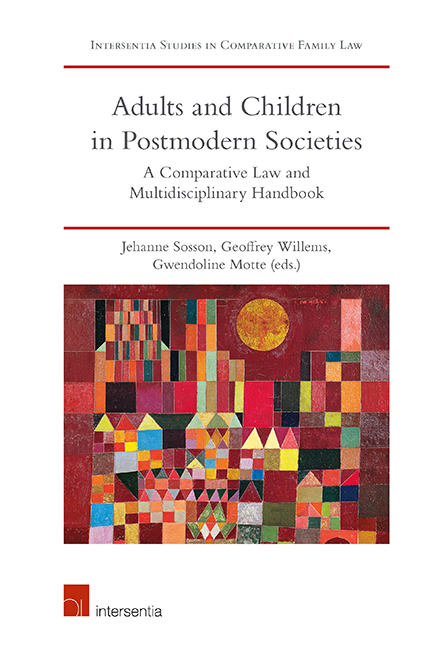Book contents
- Frontmatter
- Contents
- List of Cases
- List of Contributors
- Introduction
- PART I NATIONAL REPORTS ON LEGAL REGULATIONS OF RELATIONSHIPS BETWEEN ADULTS AND CHILDREN
- Questionnaire
- Models
- Algeria
- Argentina
- Australia
- Belgium
- Canada
- Democratic Republic of the Congo
- England and Wales
- France
- Germany
- Ireland
- Italy
- Japan
- The Netherlands
- Romania
- Spain and Catalonia
- Sweden
- Switzerland
- United States of America
- PART II INTERDISCIPLINARY APPROACH
- PART III INTERNATIONAL LAW INSIGHTS
- PART IV COMPARATIVE APPROACH
- General Conclusion: The Challenge of Transparent and Inclusive Parenthood/Parentality in a Pluralist and Cosmopolitan Context
- About the Editors
Germany
from PART I - NATIONAL REPORTS ON LEGAL REGULATIONS OF RELATIONSHIPS BETWEEN ADULTS AND CHILDREN
Published online by Cambridge University Press: 26 June 2019
- Frontmatter
- Contents
- List of Cases
- List of Contributors
- Introduction
- PART I NATIONAL REPORTS ON LEGAL REGULATIONS OF RELATIONSHIPS BETWEEN ADULTS AND CHILDREN
- Questionnaire
- Models
- Algeria
- Argentina
- Australia
- Belgium
- Canada
- Democratic Republic of the Congo
- England and Wales
- France
- Germany
- Ireland
- Italy
- Japan
- The Netherlands
- Romania
- Spain and Catalonia
- Sweden
- Switzerland
- United States of America
- PART II INTERDISCIPLINARY APPROACH
- PART III INTERNATIONAL LAW INSIGHTS
- PART IV COMPARATIVE APPROACH
- General Conclusion: The Challenge of Transparent and Inclusive Parenthood/Parentality in a Pluralist and Cosmopolitan Context
- About the Editors
Summary
CHANGES IN THE TRADITIONAL FAMILY
A. MOTHERS
1. Is maternity automatically established by the birth certificate?
Under German law, the deciding factor is not the content of the birth certificate, but rather the fact that a particular woman has given birth to the child in question. According to Sect. 1591 of the German Civil Code (Bürgerliches Gesetzbuch /BGB), a child's mother is always the woman who gave birth to it. The birth of a child must be reported to the civil registry (Standesamt) within one week (Sect. 18(1) of the Civil Status Act (Personenstandsgesetz /PStG)). The civil registry records the birth in the register of births (Sect. 21 PStG) and issues a birth certificate on that basis (Sect. 59 PStG). These documents possess special evidential value (Sect. 54(1) and (2) PStG), though evidence may always be presented that the information recorded in the register of births or the birth certificate is incorrect (Sect. 54(3) PStG).
2. Does your jurisdiction recognise any kind of ‘anonymous childbirth’?
The Act for the Extension of Assistance for Pregnant Women and the Regulation of Confidential Births (Gesetz zum Ausbau der Hilfen für Schwangere und zur Regelung der vertraulichen Geburt) has been in force since 1 May 2014. This Act enables pregnant women to give birth under a pseudonym. However, the woman's real identity must previously have been recorded by a counselling centre. The mother's identity is then transmitted to the Federal Office for Family and Civic Tasks (Bundesamt für Familie und zivilgesellschaftliche Aufgaben) and kept in confidence. The child's birth certificate does not record the pseudonym; the entries pertaining to the parents are left blank instead (Sect. 21(2a) PStG). The child generally has the right to have its mother's true identity revealed after its 16th birthday. However, a mother who gave her child away can file an objection with a counselling centre after the child's 15th birthday under Sect. 31(2) – (4) of the Act for the Prevention and Solving of Pregnancy Conflicts (Gesetz zur Vermeidung und Bewältigung von Schwangerschaft skonflikten / SchKG) to prevent her identity from being revealed.
- Type
- Chapter
- Information
- Adults and Children in Postmodern SocietiesA Comparative Law and Multidisciplinary Handbook, pp. 285 - 322Publisher: IntersentiaPrint publication year: 2019



